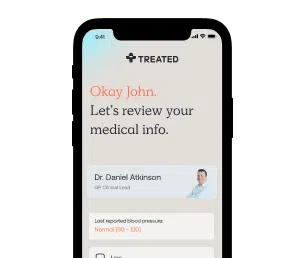Gout
Tablets for sudden arthritic joint pain
Secure delivery
UK clinicians
Gout is a form of arthritis, which is where a joint (or joints) become inflamed. The affected joint becomes hot, red and swollen.
Generally, it only affects one joint at a time (usually your big toe) but it can impact other joints such as your feet, hands, wrists, elbows or knees too. It may flare up suddenly, often lasting for several days or even weeks, before going back into remission. It’s an extremely painful and uncomfortable condition and you may experience recurring attacks, known as chronic gout.
It can be eased or prevented using medication. But avoiding foods which are high in purines (so sugary drinks like sodas, seafood such as scallops, meats including liver and alcohol), exercising regularly and losing weight can also help.
Men are more susceptible to suffering from gout than women, and it’s more common amongst older people. Other issues which can contribute towards the onset of gout can include obesity and diet. Ethnicity can also be a contributing cause, with a higher prevalence of gout amongst ethnic minorities, particularly black people.
Other factors which can increase the likelihood of gout are:
Although not especially common, it’s estimated that gout affects between 1 and 2% of the UK population. Men over 30 are most likely to be the main sufferers, as well as women who have gone through the menopause. Worldwide, it’s believed as many as 6% of the population is affected at one time or another.

How we source info.
When we present you with stats, data, opinion or a consensus, we’ll tell you where this came from. And we’ll only present data as clinically reliable if it’s come from a reputable source, such as a state or government-funded health body, a peer-reviewed medical journal, or a recognised analytics or data body. Read more in our editorial policy.
Gout is triggered by the build-up of uric acid in the blood. If too much uric acid is produced or the kidneys cannot filter it out, it begins to accumulate and form tiny sharp crystals in and around the joints, causing them to become inflamed (swollen and red) and painful.
Certain foods which contain purines, including red meat, seafood, alcoholic drinks and sweetened drinks (which have fructose in them) can trigger higher levels of uric acid too.
Any joint can be affected by gout, although it’s often the ends of the limbs which are prone to it, such as toes, ankles, knees and fingers. When an attack of gout occurs, it’s typically sudden and severe. The affected joint can suddenly feel hot and very tender, with swelling in and around the area and red, shiny skin over the affected joint. It’s accompanied or followed by severe, long lasting pain.
Symptoms normally develop very quickly over a few hours and can last from a few days up to two weeks. Afterwards the pain will usually subside and the joint should return to normal.
Almost everyone who experiences gout will at some point suffer from further attacks, usually within a year. These subsequent attacks or chronic gout can in turn lead to other problems, in which the joint can become damaged. In addition, urinary (kidney) stones are found in 14% of gout sufferers. Other, more severe complications associated with gout are chronic kidney disease, myocardial infarction (heart attack) and other heart problems.

How we source info.
When we present you with stats, data, opinion or a consensus, we’ll tell you where this came from. And we’ll only present data as clinically reliable if it’s come from a reputable source, such as a state or government-funded health body, a peer-reviewed medical journal, or a recognised analytics or data body. Read more in our editorial policy.

How we source info.
When we present you with stats, data, opinion or a consensus, we’ll tell you where this came from. And we’ll only present data as clinically reliable if it’s come from a reputable source, such as a state or government-funded health body, a peer-reviewed medical journal, or a recognised analytics or data body. Read more in our editorial policy.
Have something specific you want to know? Search our info below, or ask our experts a question if you can’t find what you’re looking for.
Global epidemiology of gout: prevalence, incidence, treatment patterns and risk factors. Nature reviews. Rheumatology, 16 (7), 380–390.
Racial and gender disparities among patients with gout. Current rheumatology reports, 15(2), 307.
CKS is only available in the UK. [Accessed 26 Oct. 2021].

Like Zyloric, but the generic. Daily tablet that treats both gout and kidney stones.

Fast-acting tablet for gout that can be used on demand and for long term relief from symptoms.

Registered with GMC (No. 4624794)
Meet Daniel
Registered with GPhC (No. 2202465)
Meet Sanjeda
Registered with GPhC (No. 2070724)
Meet Craig
Always read the leaflet that comes with your medication and tell us about any side effects you get.
We know health, but you know you.
Our experts tell you what’s safe, but you decide what’s best.
Answer a few questions and tell us about yourself. Get tailored advice from our clinicians so you can choose better.

Choose your treatment and how often you have it delivered.

We know things change. It’s the nature of life. We’ll check in regularly to make sure your treatment is still right for you.
Pause. Change. Skip. Start again. Any time you like.
Here are some other things we can help with.
Choose from our range of tablets and solutions. Get ongoing care and support from our experts.
Stop smoking treatments that can help you kick the habit forever, and reduce your risk of disease.
Tablets or injections. Tailored weight loss treatments combined with ongoing support from our experts.
We're making healthcare more about you. Sign up to our newsletter for personalised health articles that make a difference.
Disclaimer: The information provided on this page is not a substitute for professional medical advice, diagnosis, or treatment. If you have any questions or concerns about your health, please talk to a doctor.
We couldn't find what you're looking for.
Here's everything we treat. Or, if you're looking for something we don't have yet, you can suggest something.
If there’s a particular treatment or condition you’re looking for, tell us and we’ll look into it for you.
Submit your question here, or tell us if you’ve found an issue on our site.
We’ll get back to you very soon. We aim to respond to all queries in one working day.
You’re signed up to our newsletter. Keep an eye on your inbox for our latest update.
By clicking 'Subscribe now' you're agreeing to our Privacy Policy.
We’ve sent you an email asking you to confirm your email address.